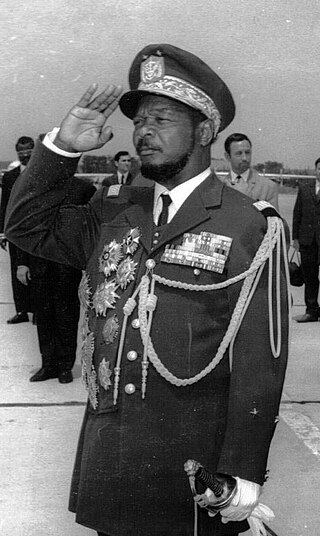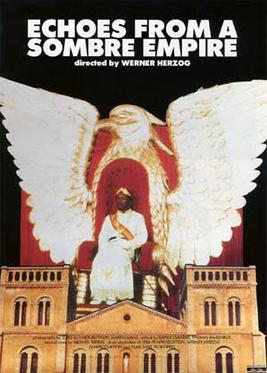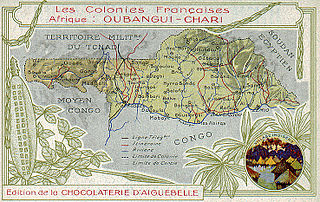| |||||
| Decades: | |||||
|---|---|---|---|---|---|
| See also: | Other events of 1966 History of the Central African Republic | ||||
The following lists events that happened during 1966 in the Central African Republic .
| |||||
| Decades: | |||||
|---|---|---|---|---|---|
| See also: | Other events of 1966 History of the Central African Republic | ||||
The following lists events that happened during 1966 in the Central African Republic .

Jean-Bédel Bokassa was a Central African political and military leader. He became the second president of the Central African Republic (CAR) after seizing power in the Saint-Sylvestre coup d'état on 1 January 1966. He later established the Central African Empire (CAE) with himself as emperor, reigning as Bokassa I until his overthrow in a 1979 coup.

The Central African Empire was established on 4 December 1976 when the then-President of the Central African Republic, Jean-Bédel Bokassa, declared himself Emperor of Central Africa. The empire would fall less than three years later when French and Central African forces overthrew Bokassa and re-established the Central African Republic on 21 September 1979.

David Dacko was a Central African politician who served as the first President of the Central African Republic from 14 August 1960 to 1 January 1966 and as the third President of the Central African Republic from 21 September 1979 to 1 September 1981. He also served as Prime Minister of the Central African Republic from 1 May 1959 to 14 August 1960. After his second removal from power in a coup d'état led by General André Kolingba, he pursued an active career as an opposition politician and presidential candidate with many loyal supporters; Dacko was an important political figure in the country for over 50 years.

Bernard Ayandho was a Central African politician and diplomat. He was Prime Minister of the Central African Republic from 26 September 1979 to 22 August 1980.
The Mbaka are a minority ethnic group in the Central African Republic and northwest Democratic Republic of the Congo. The M'Baka speak the Mbaka language and have a population of roughly 300,000.

Echoes From a Sombre Empire is a documentary film by Werner Herzog about Jean-Bédel Bokassa.
Bobangui is a large M'Baka village in Lobaye, Central African Republic, located at the edge of the equatorial forest some 80 kilometres (50 mi) southwest of the capital, Bangui. The first Prime Minister of the Central African Republic, Barthélemy Boganda, the first President of the Central African Republic, David Dacko, and the emperor of the Central African Empire, Jean-Bédel Bokassa, were from Bobangui.

The Movement for the Social Evolution of Black Africa was a political party in the Central African Republic. In its original form, it was a nationalist quasi-religious party that sought to affirm black humanity and advocated for the independence of Ubangi-Shari, then a French colonial territory.

Presidential elections were held in the Central African Republic on 15 March 1981. They were the first national elections of any sort since 1964, the first elections since the overthrow of longtime ruler Jean-Bédel Bokassa in 1979, and the first multiparty presidential elections since independence. Five candidates—incumbent president David Dacko, Ange-Félix Patassé, François Pehoua, Henri Maïdou and Abel Goumba—stood in the election.

The Saint-Sylvestre coup d'état was a coup d'état staged by Jean-Bédel Bokassa, commander-in-chief of the Central African Republic (CAR) army, and his officers against the government of President David Dacko on 31 December 1965 and 1 January 1966. Dacko, Bokassa's cousin, took over the country in 1960, and Bokassa, an officer in the French army, joined the CAR army in 1962. By 1965, the country was in turmoil—plagued by corruption and slow economic growth, while its borders were breached by rebels from neighboring countries. Dacko obtained financial aid from the People's Republic of China, but despite this support, the country's problems persisted. Bokassa made plans to take over the government; Dacko was made aware of this, and attempted to counter by forming the gendarmerie headed by Jean Izamo, who quickly became Dacko's closest adviser.
Lieutenant Colonel Alexandre Banza was a military officer and politician in the Central African Republic. Born in Carnot, Ubangi-Shari, Banza served with the French Army during the First Indochina War before joining the Central African Armed Forces. As commander of the Camp Kassaï military base in 1965, Banza helped Jean-Bédel Bokassa overthrow the government of President David Dacko. Bokassa rewarded Banza by appointing him as minister of state and minister of finance in the new government. Banza quickly established the new regime's reputation abroad and forged diplomatic relations with other countries. In 1967, Bokassa and his protégé had a major argument over the president's extravagances. In April 1968, Bokassa removed Banza as minister of finance. Recognizing Bokassa's attempts to undermine him, Banza made a number of remarks highly critical of the president's handling of the government. Bokassa responded by abolishing the minister of state position.
Jean-Henri Izamo was the head of the gendarmerie of the Central African Republic. He was killed following the Saint-Sylvestre coup d'état.

The House of Bokassa is an African former ruling imperial dynasty. Its founder, Jean-Bédel Bokassa, ruled as self-crowned emperor over the territories of the Central African Empire from 4 December 1976 until 21 September 1979, when he was overthrown. His claim to an imperial title had little recognition in the international community.

Marie-Josèphe Zani-Fé Touam-Bona was a politician in the Central African Republic (CAR). She was the country's first female government minister.

Central African Republic–France relations are foreign relations between the Central African Republic (CAR) and France. Both nations are members of the Francophonie and the United Nations.
Michel Adama-Tamboux was a Central African politician and diplomat. He was President of the National Assembly of the Central African Republic from 1960 to 1966. He was incarcerated by Jean-Bédel Bokassa from 1966 to 1970, and served as the ambassador to the United Nations and Egypt in the 1970s.
Jean-Barthélémy Bokassa is a French-Central African socialite, artist and novelist. He is the eldest grandson of Jean-Bedel Bokassa, the 2nd President of the Central African Republic and later the self-proclaimed Emperor Bokassa I of its successor state, the Central African Empire.
Sylvestre Bangui was a Central African general, diplomat and politician. He rose amongst the ranks of the Central African Armed Forces to become a general, and was away for military training when Jean-Bédel Bokassa carried out his coup d'état in 1965. Bokassa appointed him as an ambassador, first to Canada and then to France. In 1979, he carried out a press conference where he denounced his government for carrying out a massacre of children, resigned and formed an opposition group. After Bokassa's deposition, he served as the Minister of Foreign Affairs in 1979 and 1980. He also served as the Minister of Economy and Finance in 1983 and 1984.